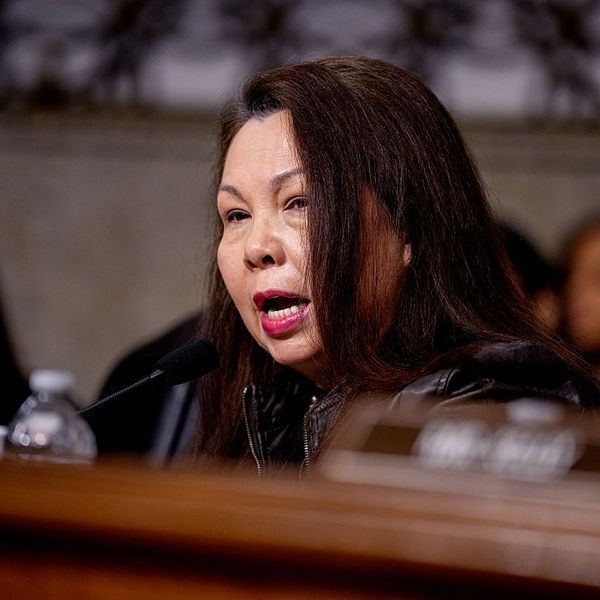As the nation reels from two recent fatal police shootings of black men, Republican presidential candidate Donald Trump on Wednesday called for cities nationwide to adopt "stop-and-frisk"--a widely condemned police practice that New York City was forced to abandon after a federal judge struck it down as unconstitutional, finding that it disproportionately targeted minorities.
"'I would do stop-and-frisk. I think you have to,' Trump said, according to excerpts of a Fox News 'town hall' in Cleveland, after a listener asked what he would do to reduce crime in predominantly black communities across the nation," reports Reuters.
Trump's "support for the polarizing crime-fighting policy--which involves officers' questioning and searching pedestrians--collides with his highly visible courtship of African-Americans, who have been disproportionately singled out by the tactic, data show," the New York Times writes.
"We did it in New York," Trump said of the practice. "It worked incredibly well and you have to be proactive."
Former NAACP president Benjamin Jealous characterized the tactic as "the worst racial profiling program in the country, in any city," back when it was still in wide use in New York City.
The tactic was encouraged and became widespread in New York under the mayorship of Rudolph Giuliani, who is now an avid Trump supporter.
Federal judge Shira A. Scheindlin found in 2013 that "in [city officials'] zeal to defend a policy that they believe to be effective, they have willfully ignored overwhelming proof that the policy of targeting 'the right people' is racially discriminatory and therefore violates the United States Constitution."
"Ending the practice in New York was a key plank of Democrat Bill de Blasio's successful 2013 run for mayor," as Reuters notes.
De Blasio immediately condemned Trump's advocacy for the tactic, calling the candidate's proposal "appalling." De Blasio told NBC that "he's either ignorant about the history of the city or he's lying about it."
Civil rights and social justice advocates also decried Trump's comments.
"The idea of creating a national stop-and-frisk policy is the equivalent of advancing martial law and is beyond the constitutional power of the presidency," Marc H. Morial, president of the National Urban League, told the New York Times in an email.
And one African-American attendee at the Cleveland town hall told Reuters that he was dismayed by Trump's speech:
[Geoff] Betts, a hair products distributor, said he was registered to vote as an independent and attended to learn how Trump would try to win over black voters.
He said he thought police unfairly discriminated against black citizens and that he opposed stop-and-frisk.
"We are victims," he said, adding that he had walked out of the meeting. "I just couldn't take it anymore, I had to go. I don't think that Donald Trump gets it."
Democratic presidential candidate Hillary Clinton also responded to this week's shootings by suggesting changes to policing tactics nationwide but took a very different tact: Clinton called for nationwide training programs to work to eliminate "implicit bias" within police forces, and also put forth a plan "to restore bonds between communities and law enforcement," according to campaign manager Robbie Mook's comments to CNN.
Trump's inopportune advocacy for stop-and-frisk followed his extremely controversial comments about African-American communities at a Tuesday rally, in which he said: "We're going to rebuild our inner cities because our African-American communities are absolutely in the worst shape that they've ever been in before. Ever. Ever. Ever."
NAACP president Cornell William Brooks reacted to those statements on CNN:
Mr. Trump, for anyone to assert that the African-American community is in the worst shape ever, ever, ever, to say that, to assert that with a semi-straight face is to demonstrate an insulting degree of ignorance and/or insensitivity, to ignore the fact that African-Americans were lynched, African-Americans were forced to drink out of colored water fountains, ride the back of the bus, were enslaved in this country [...] it demonstrates a profound ignorance of history, but also demonstrates a profound insensitivity to what we are going through at this very moment.
Indeed, as David A. Graham wrote in the Atlantic in response to Trump's stop-and-frisk comments, "African Americans, as well as many white [people], are currently outraged, horrified, and despairing over the deaths of Terence Crutcher and Keith Lamont Scott, the types of shootings that provoke widespread fear and distrust of the police around the country."
"It is almost unbelievable that against such a backdrop, and under the guise of outreach to black Americans, Trump would propose the expansion of a policy that also undermines black trust in the police," Graham argued. "Unless he isn't reaching out to them at all."


